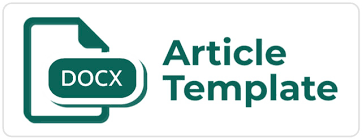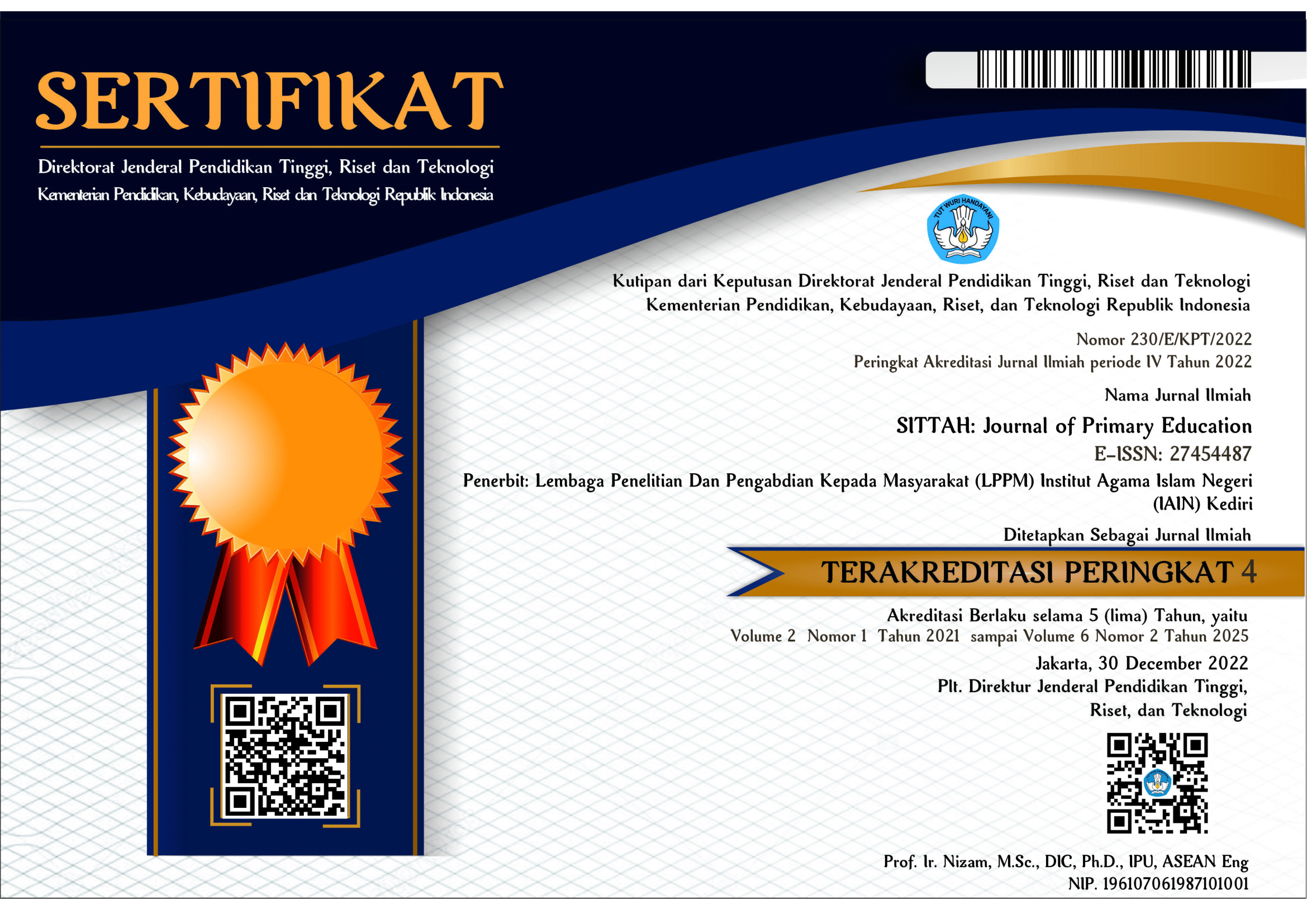STUDENTS' RESPONSES OF JOYFUL LEARNING CLASS IN ISLAMIC ELEMENTARY SCHOOL: FLASHCARD GAMES AND VISUAL WORKSHEET
DOI:
https://doi.org/10.30762/sittah.v4i2.1950Keywords:
English Learning, Flashcard Games, Joyful Learning, Visual Worksheet, Young LearnersAbstract
The four characteristics of young learners, which can be embodied in learning that is active, fun, concrete, and uses sensory experiences, should be considered to optimize vocabulary learning. Therefore, this qualitative research aims to investigate students' responses to the joyful vocabulary class by implementing flashcard games and visual worksheets. The instruments used were a Likert scale questionnaire, interviews, observation, and documentation, with 20 students in the second grade of SD Sunan Ampel Kediri acting as respondents selected using purposive sampling. The results showed positive student responses to the Joyful Vocabulary Learning Class. This approach not only encourages active participation, motivation, and fun in learning vocabulary but also enables students to remember vocabulary easily and understand its meaning due to the combination of concretizing the abstract with the sense of sight by visualizing through pictures of animals and creating an active and fun class in the form of games. In conclusion, the use of flashcard games and visual worksheets to promote a joyful vocabulary class can be used to teach English to young learners.
Downloads
References
Arifin, A. (2003). Some Games Used to Teach Vocabulary to Young Learners. TEFLIN Journal, 14(2), 239–247. https://doi.org/10.15639/teflinjournal.v14i2/239-247
Carter, N., Bryant-Lukosius, D., DiCenso, A., Blythe, J., & Alan J. Neville. (2014). The Use of Triangulation in Qualitative Research. Oncology Nursing Forum (ONF), 41(5), 545–547. https://doi.org/10.1188/14.ONF.545-547
Copple, C., & Bredekamp, S. (Eds.). (2008). Developmentally Appropriate Practice in Early Childhood Programs Serving Children from Birth Through Age 8 (Third edition). The National Association for the Education of Young Children.
Creswell, J. W., & Creswell, J. D. (2018). Research Design: Qualitative, Quantitative, and Mixed Methods Approaches (5th edition). SAGE Publications, Inc.
Elisa, H., & Tuti, T. (2020). An Evaluation of the Use of Flashcard for Teaching Vocabulary at Kindergartens in Sintang. JETL (Journal of Education, Teaching and Learning), 5(2), 388–392. https://doi.org/10.26737/jetl.v5i2.2040
Fachraini, S. (2017). Using English Songs to Increase Early Students' Vocabulary. Getsempena English Education Journal, 4(2), 185–194. https://doi.org/10.46244/geej.v4i2.754
Hartina, S. (2019). Teachers' Techniques in Teaching English to Young Learners. Indonesian TESOL Journal, 1(1), Article 1. https://doi.org/10.24256/itj.v1i1.538
Herlina, H., & Dewi, R. R. (2017). Flashcard Media: The Media for Developing Students Understanding for English Vocabulary at Elementary School. IJER - Indonesian Journal of Educational Review, 4(1), Article 1. https://doi.org/10.21009/IJER.04.01.11
Istiqomah, F. (2010). Communicative Language Teaching for Elementary Schools in Indonesia: Joyful Learning Through Games. Jurnal Bahasa Lingua Scientia, 2(2), 183–194. https://doi.org/10.21274/ls.2010.2.2.183-194
Komachali, M., & Khodareza, M. (2012). The Effect of Using Vocabulary Flash Card on Iranian Pre-University Students' Vocabulary Knowledge. International Education Studies, 5(3), Article 3. https://doi.org/10.5539/ies.v5n3p134
Maming, K., Patahuddin, A, N., Sianna, & Arsyad, N. A. (2023). Joyful Learning as a Worthwhile Instructional Activity for English Beginner Students in the Post-Covid-19 Pandemic Era. Ethical Lingua: Journal of Language Teaching and Literature, 10(1). https://doi.org/10.30605/25409190.569
Mehta, N. K. (2009). Vocabulary Teaching: Effective Methodologies. The Internet TESL Journal, XV(3). http://iteslj.org/Techniques/Mehta-Vocabulary.html
Purnami, N. L. S. W. (2022). Fun Activities to Teach Vocabulary for Young Learners: A Library Research. E-Link Journal, 9(1), Article 1. https://doi.org/10.30736/ej.v9i1.609
Ramadhani, I. F., Ma’rifah, U., Srimuang, P., & W, W. (2023). The Effect of Implementing Student Pictorial Worksheet on the Vocabulary Skill of Student Wangsaphung School, Thailand. IDEAS: Journal on English Language Teaching and Learning, Linguistics and Literature, 11(1), Article 1. https://doi.org/10.24256/ideas.v11i1.3894
Richards, J. C., & Renandya, W. A. (Eds.). (2002). Methodology in Language Teaching: An Anthology of Current Practice. Cambridge University Press. https://doi.org/10.1017/CBO9780511667190
Smith, Y. (2018, January 30). 15 Simple Flashcard Games Your Kindy Kids Will Love [Shane English Schools Worldwide]. https://shaneschools.com/15-simple-flashcard-games-your-kindy-kids-will-love/
Sukmawati, N. N. (2018). Teacher Talk in Teaching English for Young Learners. Jurnal Varidika, 30(1), Article 1. https://doi.org/10.23917/varidika.v30i1.6545
Taghizadeh, M., Vaezi, S., & Ravan, M. (2018). Digital Games, Songs and Flashcards and their Effects on Vocabulary Knowledge of Iranian Preschoolers. International Journal of English Studies, 5(4), 156–171.
Wicaksono, S. (2020). Joyful Learning in Elementary School. International Journal of Theory and Application in Elementary and Secondary School Education, 2(2), 80–90. https://doi.org/10.31098/ijtaese.v2i2.232
Widyawulandari, R., Sarwanto, & Indriayu, M. (2019). Implementation of Joyful Learning Approach in Providing Learning Motivation for Elementary School Student. 277, 54–58. https://doi.org/10.2991/steach-18.2019.12
Downloads
Published
How to Cite
Issue
Section
License
Copyright (c) 2023 Renita Donasari, Tutik Dinur Rofiah, Athi’illah Qurroti

This work is licensed under a Creative Commons Attribution-NonCommercial-ShareAlike 4.0 International License.











